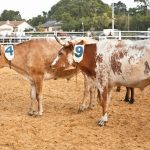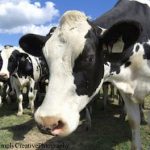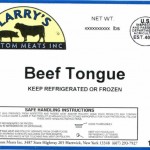United States Senator Jon Tester (D-Montana) has introduced a bill to suspend beef imports from Brazil after there have been repeated issues with delayed reporting of Bovine Spongiform Encephalopathy (BSE), or Mad Cow Disease, in beef products. The legislation would force a systemic review of the beef's safety before imports could resume. Tester said in a statement, "Montanans demand the highest level of safety and certainty in their beef, and Brazilian imports aren’t making the cut. Folks expect their beef to have been rigorously tested against the strictest of standards, and concerns about Brazilian imports not only jeopardize consumer trust, but present a serious risk to Montana producers. We owe it to our domestic producers and consumers to halt Brazilian imports until we can … [Read more...]
Cow with Atypical BSE Diagnosed in Alabama
The USDA announced on Tuesday, July 18, 201 that an eleven year old cow in Alabama has been diagnosed with an atypical case of Bovine Spongiform Encephalopathy (BSE), or mad cow disease. The press release states that "This animal never entered slaughter channels and at no time presented a risk to the food supply, or to human health in the United States." The animal was showing clinical signs of the disease and was round through routine surveillance at an Alabama livestock market. Atypical BSE is different from classic BSE and it usually occurs in cattle older than 8 years. It arises spontaneously and rarely in all cattle populations. The press release from the Alabama Department of Agriculture & Industries states that following delivery to the livestock market, the cow later … [Read more...]
FDA Announces Final Rule on Mad Cow Disease in Food
The FDA has finalized a rule designed to reduce the risk of bovine spongiform encephalopathy (BSE), sometimes called "mad cow disease" in human food. This rule covers definitions for prohibited cattle materials in food, dietary supplements, and cosmetics. The materials include specified risk materials (SRMs) of brain, skull, eyes, trigeminal ganglia, spinal corn, vertebral column, and dorsal root ganglia of cattle 30 months of age and older, and the tonsils and distal ileum of the small instating of all cattle. Also prohibited are the small intestine from all cattle unless the distal ileum has been properly removed, material from non ambulatory cattle, and material from cattle not inspected and passed, or mechanically separated beef. The rule confirms that milk and milk products, … [Read more...]
Larry’s Custom Meats Recalls Beef Tongue for BSE Risk
Larry's Custom Meats in New York is recalling 529 pounds of beef tongue products that may have been shipped with the lingual tonsils still attached. These are lymphatic tissue which is considered risk materials for BSE (Bovine Spongiform Encephalopathy), or mad cow disease. No illnesses have been reported to date. The recalled product is 1-1/2 pounds packages of "Larry's Custom Meats Inc. Beef Tongue". They were produced on various dates between October 23, 2014 and June 12, 2015. They were shipped to retail locations in New York and Pennsylvania. They have the establishment number "EST. 40359" inside the USDA mark of inspection. If you purchased this product, do not eat it. Discard or return to the place of purchase for a refund. … [Read more...]
Canada Confirms New Case of Mad Cow
The Canadian Food Inspection Agency (CFIA) has confirmed its first case of mad cow disease, or bovine spongiform encephalopathy (BSE) in a beef cow since 2011 and the fourteenth case since 2005. The government says that no part of the animal's carcass entered the human or animal food systems. These cases, in addition to the consumers' right to know, are one reason consumer's advocates want to see country of origin labels (COOL) on imported meats. The beef cow was from Alberta, Canada. BSE is a progressive, fatal disease with no cure. It is caused by proteins called prions that are not destroyed by cooking. The prions are also very resistant to UV radiation, disinfectants, and ionizing radiation, but can be destroyed by a combination of those treatments and time. The disease has a … [Read more...]
Bubier Meats of Maine Recalls Beef for BSE Risk
Bubier Meats of Greene, Maine is recalling 25,192 pounds of beef for possible bovine spongiform encephalopathy (BSE) risk. BSE is also known as mad cow disease. No illnessees have been reported in association with this recall. The problem was discovered by states health officials during a routine records review of slaughter logs. They describe the problem as a low risk. The recalled meats were sold from November 2013 to August 2014 at Rosemont Markets in Portland and Yarmouth, and Maine Meat in Kittery. The recalled products were processed into smaller cuts at these locations and sold without identification on consumer packaging. … [Read more...]
Ribeye and Beef Carcass Recalled for BSE Risk Materials
Fruitland American Meat of Missouri is recalling about 4,012 pounds of fresh beef products because the dorsal root ganglia may not have been completely removed. That material is considered a risk for BSE, or mad cow disease, and agency regulations state it must be removed in products made from cattle older than 30 months. The products being recalled are 40 pound cases containing two 20 pound packages of bone-in "Rain Crow Ranch Ribeye" with these production dates: 9/5/13, 9/10/13, 9/11/13, 9/26/13, 10/2/13, 10/3/2013, 11/8/13, 11/22/13, 12/17/13, 12/26/13, 12/27/13,1/16/14, 1/17/14, 1/23/14, 1/31/14, 2/13/14, 2/14/14, 2/21/14, 2/28/14, 3/8/14, 3/20/14, 4/4/14 or 4/25/14. The dates are printed on the box. Also recalled are quartered beef carcasses. All products have the establishment … [Read more...]
In Texas, Man Died From Variant CJD
According to the CDC, lab tests have confirmed a diagnosis of variant CJD in a patient who recently died in Texas. Variant CJD is a rare, degenerative, fatal brain disorder caused by consumption of products from cattle with mad cow disease. Bovine spongiform encephalopathy (BSE), or mad cow disease, has been a problem in many countries for decades. The disease was first reported in 1996, with 229 patients from 12 countries. According to the CDC, from 1996 to June 2, 2014, variant CJD cases have occurred in these countries: 77 from the United Kingdom, 27 from France, 5 from Spain, 4 from Ireland, 4 from the United States, 3 from the Netherlands, 2 from Portugal, 2 from Italy, 2 from Canada and one each from Japan, Saudi Arabia, and Taiwan. Scientists believe mad cow disease is caused … [Read more...]
Mad Cow Emerges in Germany
At least one case of bovine spongiform encephalopathy (BSE), otherwise known as Mad Cow Disease, has been confirmed in Germany. That country has claimed for years that its country was free of BSE, but they were wrong. Public health officials claim that the cow was killed and none of it entered the food chain. Germany instituted "high standards" for animal feed, but traces of meat and bone meal were found in cattle feed recently. A 1994 European Union ban on feeding ruminants meat by-products was supposed to eliminate those ingredients. The cow was 10 years old, and tested positive for atypical BSE, which develops spontaneously in older cows. It had seven offspring. Five have already been slaughtered, and two others were on the same farm. They have been tested and killed. The herd is … [Read more...]
USDA Relaxes Regulations for Mad Cow Beef Imports
Last week, the USDA's Animal and Plant Health Inspection Service (APHIS) announced its intention to publish a rule that would allow some beef to be imported from countries that have experienced cases of mad cow disease. Bovine spongiform encephalopathy (BSE) is a progressive neurological disorder that is caused by eating a prion protein from infected beef. The prion is not destroyed by cooking. The agency says this is a "modernization" of import regulations. Food & Water Watch released a statement about this decision. Wenonah Hauter, Executive Director of that agency, said, "This seems to be another case of trade trumping food safety. This development comes as the reopening of beef trade with Europe has been an issue under discussion in the Transatlantic Trade and Investment … [Read more...]













